[orc]Of the 50 odd recognized state parties, only 22 have submitted annual audit reports as on date for the year 2018-19. BJD, YSRCP, TRS & JD(S) reported a significant increase in their income in 2018-19, mainly through electoral bonds.
In an earlier story, we looked at the status of submission of ‘Annual Audit Reports’ by recognized national parties and have analysed the reports that were submitted so far for 2018-19. As is the case with recognized national parties, even the recognized state parties are required to submit their Annual Audit reports along with Contributions Report and Expenditure reports.
Only 22 recognized state parties have submitted the Annual Audit Reports.
As per Election Commission of India (ECI), there are currently 53 recognized state parties. Out of these only 22 parties have submitted their Annual Audit report as of 25 November 2019. Among these 22 political parties, 11 parties have submitted the audit reports prior to the cut-off date of i.e. 31st October.
These Parties include: AIADMK,AJSU, INLD, JD(U), JMM, JVM(P), MNS, PDA, RLD,SAD & SDF
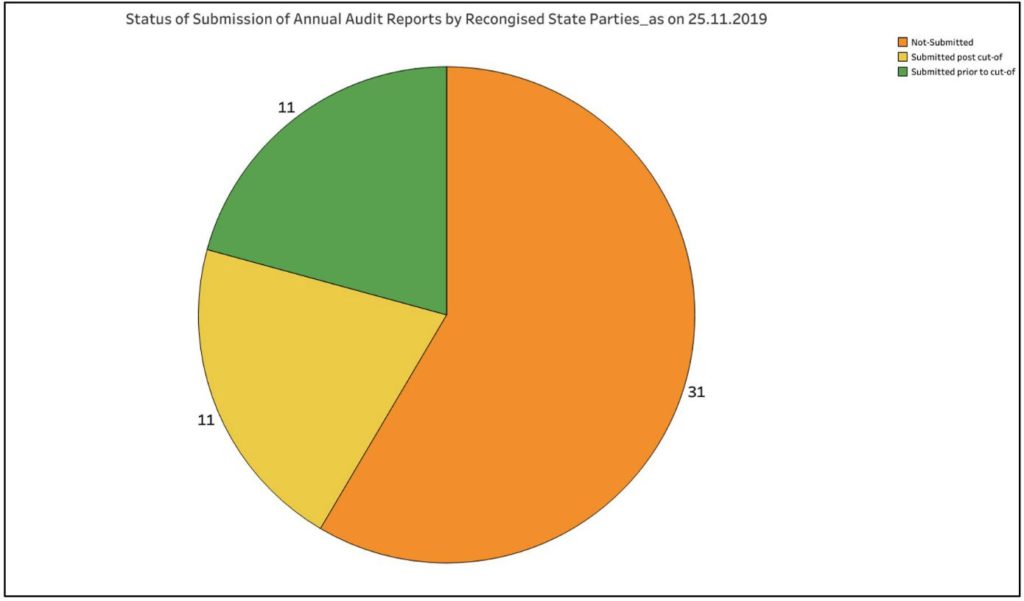
The other 11 recognized state parties which have submitted their annual audit report for 2018-19, but not prior to 31st October cut-off are : AAP, BJD, DMDK, JD(S), SP, PMK, TRS & YSRC, MGP, NPF & NDPP.
26 recognised State political parties have submitted the Contribution reports while 27 parties have submitted Expenditure reports.
Apart from the annual audit reports, the recognised state political parties are also required to submit contribution report which provides the details of the contributions received and also expenditure report which details the expenditure by the political parties during general elections.
The cut-off date to submit the contribution reports is 30th September for recognized state parties as well. However, as on date only 26 state parties have submitted the contribution reports. Of these, only 6 political parties have submitted prior to the cut-off date. These include : AIADMK, AIUDF, INLD, MNS, SAD, & TDP.
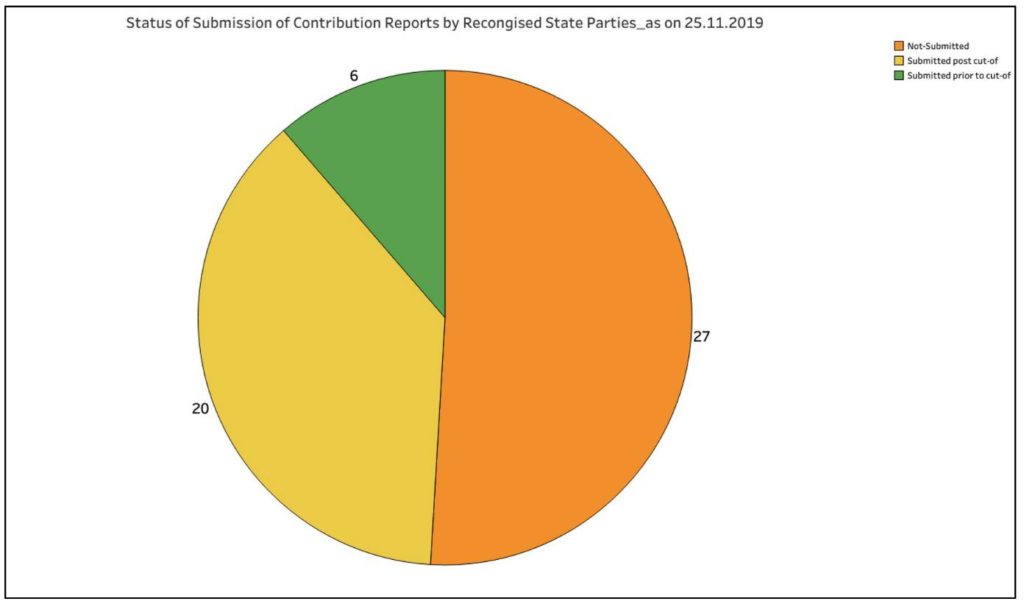
Furthermore, political parties are required to submit Expenditure report with 75 days of completion of assembly general elections and 90 days after completion of Lok Sabha general elections. While only 27 of the 53 recognized state parties have submitted their expenditure reports, only 8 political parties have submitted the reports by the cut-off date.
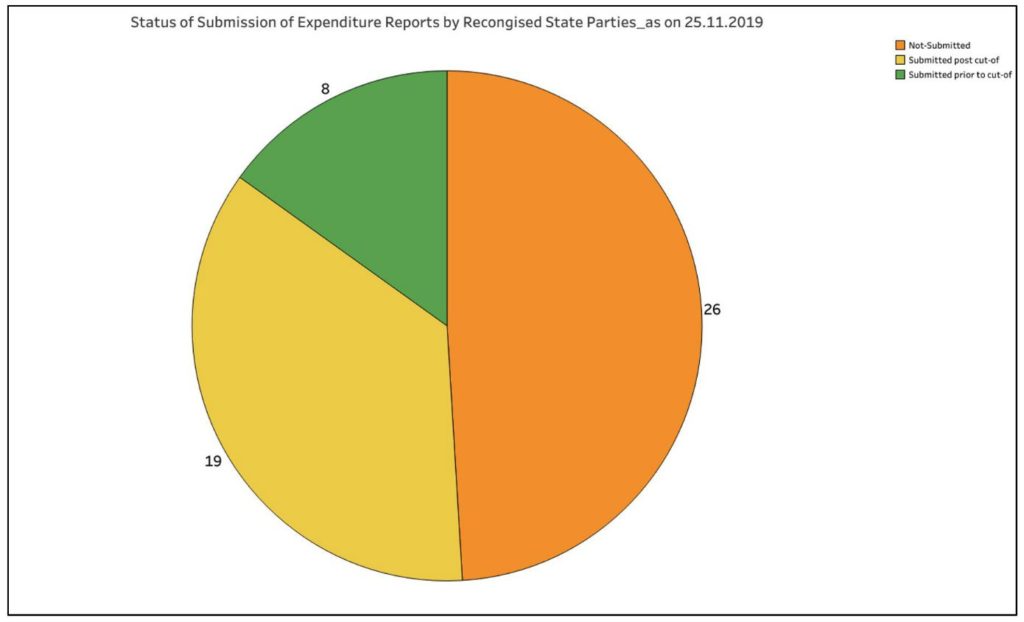
Of all the recognised State parties , only All India Anna Dravida Munnetra Kazhagam (AIADMK) and Shiromani Akali Dal (SAD), have submitted all the three reports within the cut-off dates.
Significant increase in the income of TRS and YSRCP in 2018-19, the election year
Of the 22 recognised state political parties which have submitted their Audit reports, 6 political parties belong to the southern states of India. Of these AIADMK, DMDK & PMK belong to Tamil Nadu while JD(S) has major presence in Karnataka. TRS and YSRCP belong to the two Telugu speaking states of Telangana and Andhra Pradesh respectively.
As per the annual audit reports submitted by these political parties, we can see that income of TRS and YSRCP had a significant increase in 2018-19 compared to 2017-18. This could be because both the Assembly & Lok Sabha general elections were held in these two states during this year. The assembly general elections in Telangana took place towards the end of 2018 while in Andhra Pradesh, they were held in April 2019.
All these 6 political parties reported an increase in their income. As we stated in the previous story about the national parties, this could be due to the general elections.
In 2017-18, the income of TRS was ₹ 27.3 crores which increased by nearly 7 times to ₹ 188.7 crores in 2018-19. Similarly, the revenue of YSRCP for the year 2017-18 was ₹ 14.2 crores, which has increased significantly in 2018-19 to ₹ 181.1 crores.
JD(S) which contested the Karnataka assembly general elections in April 2018 showed a revenue of ₹ 38 crores in 2018-19, while it was ₹ 15.4 crores the previous year. AIADMK also doubled up its revenue to ₹ 28.1 crores in 2018-19 from ₹ 12.7 crores in 2017-18.
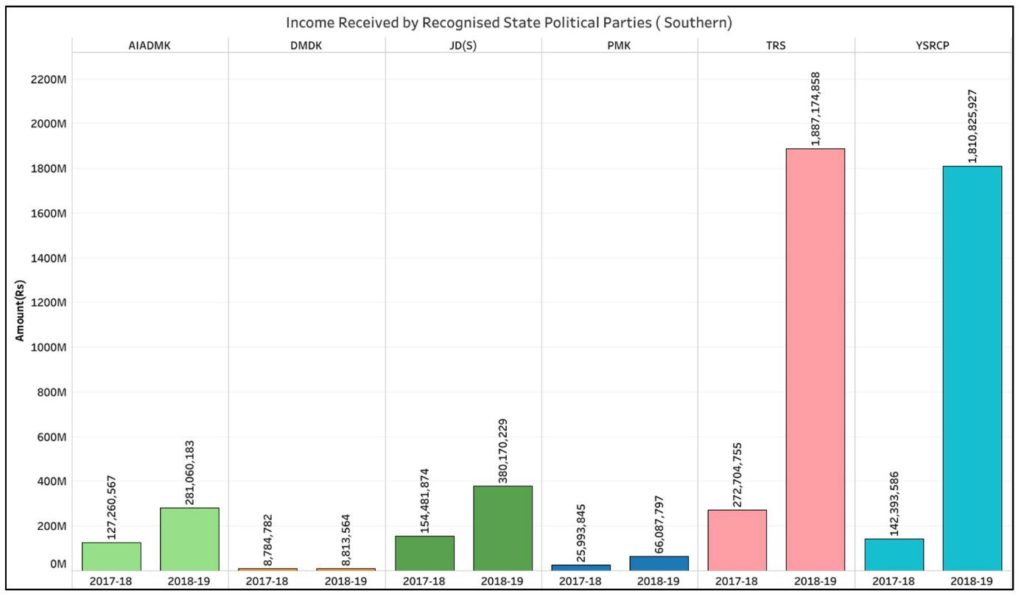
Electoral Bonds are the major income source in 2018-19 for TRS, YSRCP & JD(S)
TRS received ₹ 182.7 crores i.e. nearly 97% of its income is 2018-19 from ‘Voluntary Donations and Contributions’. As per the contribution report submitted by TRS, ₹ 24.8 crores were received through contributions of over ₹ 20,000. Another ₹ 16.5 crores were received through ‘Electoral Trusts’. However, a significant portion of donations/contributions received by TRS is through electoral bonds which amounted to ₹ 141.5 crores in 2018-19.
As per the contribution report submitted by YSRCP, approximately ₹ 53.5 crores were received through donations amounting to more than ₹ 20,000 and ₹ 27 crores were received from a single electoral trust i.e. Prudent Electoral Trust. Audit Report of YSRCP shows that ₹ 99.8 crores were received through electoral bonds in 2018-19.
Even JD(S) has received ₹ 35.3 crores of its ₹ 38 crores income in 2018-19 through electoral bonds.
Meanwhile AIADMK, reported ₹ 12.2 crores as interest income along with ₹ 10.2 crores received via ‘Fee & Subscriptions’ and another ₹ 5.7 crores are received through ‘Collection from issuance of forms & application fees’. Not a single rupee is through donations or contributions.
BJD also reported a huge increase in its income in 2018-19, mainly through Electoral Bonds
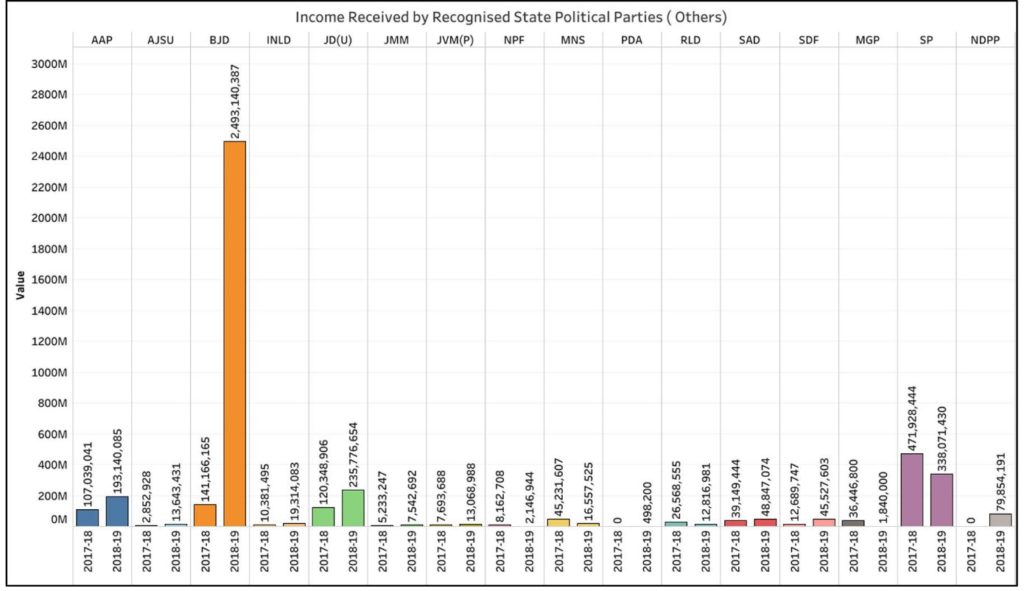
Most of the other recognized state political parties have reported an increase in the revenue for year 2018-19 over the previous year. Biju Janata Dal (BJD) also reported a significant increase in its revenue for 2018-19. In 2017-18 the income of BJD was reported as ₹ 14.1 crores, but in 2018-19, it has increased to ₹ 249.3 crores i.e. an increase by more than 17 times. Like in the case of Telangana & Andhra Pradesh, Odisha also had both assembly & Lok Sabha general elections during 2018-19. This could be the reason for such an increase in income.
The annual audit report states that ₹ 242.9 crores i.e. nearly 97% of the revenue was generated through ‘Grants/Donations/Contributions’. A significant portion of this amounting up to ₹ 213.5 crores are received through Electoral Bonds. ₹ 25 crores are received from AB General Electoral Trust.
Among the other larger recognized State Parties, AAP has nearly doubled its income with ₹ 19.3 crores in 2018-19 of which ₹ 19.2 crores are through ‘Donations and Contributions.’ Janata Dal(United) which reported an income of ₹ 23.6 crores have received ₹ 13.18 crores from donations above ₹20,000 as per their contribution report, of which ₹ 13 crores are from a single source through multiple donations.
Surprisingly, Samajwadi party has seen a dip in the income compared to 2017-18. It reported an income of ₹ 47.2 crores in 2017-18, while it is only ₹ 33.8 crores for 2018-19. The difference can be mainly attributed to the fall in income under ‘Fees & Subscription’, through which it earned ₹ 19.6 crores in 2017-18 while it is only ₹ 51.5 lakhs in 2018-19.
Non-submission of financial reports an issue even with the recognized State parties
As is the case with National Parties, even the recognised state parties are not complying with the cut-off dates as far as the submission of Annual Audit Reports, Contribution Reports and Expenditure reports are concerned. As we have seen, the number of parties who have submitted so far is less than half the total number and the number for the parties who submitted on time is much lower than that.
Such delay in the submission of reports severely handicaps any analysis and observations that can be made in respect to financial transparency. A case in point is the Telugu Desam party (TDP) in the Telegu speaking states. Both the TRS & YSRCP, the major parties in Telangana & Andhra Pradesh reported a significant increase in their income, majority of it through electoral bonds. Though TDP is also a major party in these states, they are yet to submit the annual audit report which impedes any holistic understanding of the situation.
As indicated in the earlier story, strict laws which could lead to imposition of fines for non-compliance along with the change in rules that would require the political parties to disclose all the donations received including through electoral bonds, seem like the only way out for better transparency in political funding.



2 Comments
Pingback: Only Half the State parties submit audit & contribution reports so far - Fact Checking Tools | Factbase.us
Pingback: Rs 6000-crore electoral bonds sold since Jan 2018, BJP, Congress likely to release report in October - JIFFY360.COM